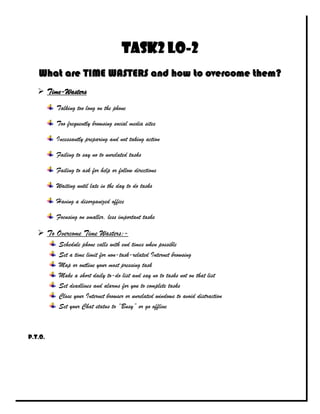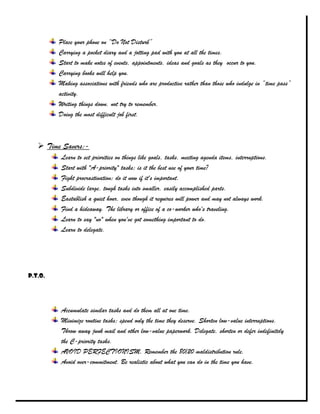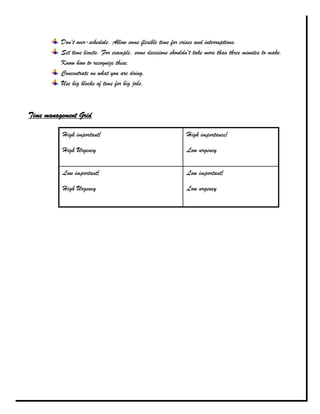Anamika Ranjan-PD Task 2 lo2
- 1. Task2 LO-2 What are TIME WASTERS and how to overcome them?  Time-Wasters Talking too long on the phone Too frequently browsing social media sites Incessantly preparing and not taking action Failing to say no to unrelated tasks Failing to ask for help or follow directions Waiting until late in the day to do tasks Having a disorganized office Focusing on smaller, less important tasks  To Overcome Time Wasters:- Schedule phone calls with end times when possible Set a time limit for non-task-related Internet browsing Map or outline your most pressing task Make a short daily to-do list and say no to tasks not on that list Set deadlines and alarms for you to complete tasks Close your Internet browser or unrelated windows to avoid distraction Set your Chat status to “Busy” or go offline P.T.O.
- 2. Place your phone on “Do Not Disturb” Carrying a pocket diary and a jotting pad with you at all the times. Start to make notes of events, appointments, ideas and goals as they occur to you. Carrying books will help you. Making associations with friends who are productive rather than those who indulge in “time pass” activity. Writing things down, not try to remember. Doing the most difficult job first.  Time Savers:- Learn to set priorities on things like goals, tasks, meeting agenda items, interruptions. Start with "A-priority" tasks; is it the best use of your time? Fight procrastination; do it now if it's important. Subdivide large, tough tasks into smaller, easily accomplished parts. Eastablish a quiet hour, even though it requires will power and may not always work. Find a hideaway. The library or office of a co-worker who's traveling. Learn to say "no" when you've got something important to do. Learn to delegate. P.T.O. Accumulate similar tasks and do them all at one time. Minimize routine tasks; spend only the time they deserve. Shorten low-value interruptions. Throw away junk mail and other low-value paperwork. Delegate, shorten or defer indefinitely the C-priority tasks. AVOID PERFECTIONISM. Remember the 80/20 maldistribution rule. Avoid over-commitment. Be realistic about what you can do in the time you have.
- 3. Don't over-schedule. Allow some flexible time for crises and interruptions. Set time limits. For example, some decisions shouldn't take more than three minutes to make. Know how to recognize these. Concentrate on what you are doing. Use big blocks of time for big jobs. Time management Grid High important/ High importance/ High Urgency Low urgency Low important/ Low important/ High Urgency Low urgency



